January 2026

The pancreatic cancer market is forecasted to expand from USD 3.01 billion in 2025 to USD 9.57 billion by 2034, growing at a CAGR of 13.7% from 2025 to 2034. The rising incidences of pancreatic cancer, growing research and development activities, and technological advancements are the major growth factors of the market.
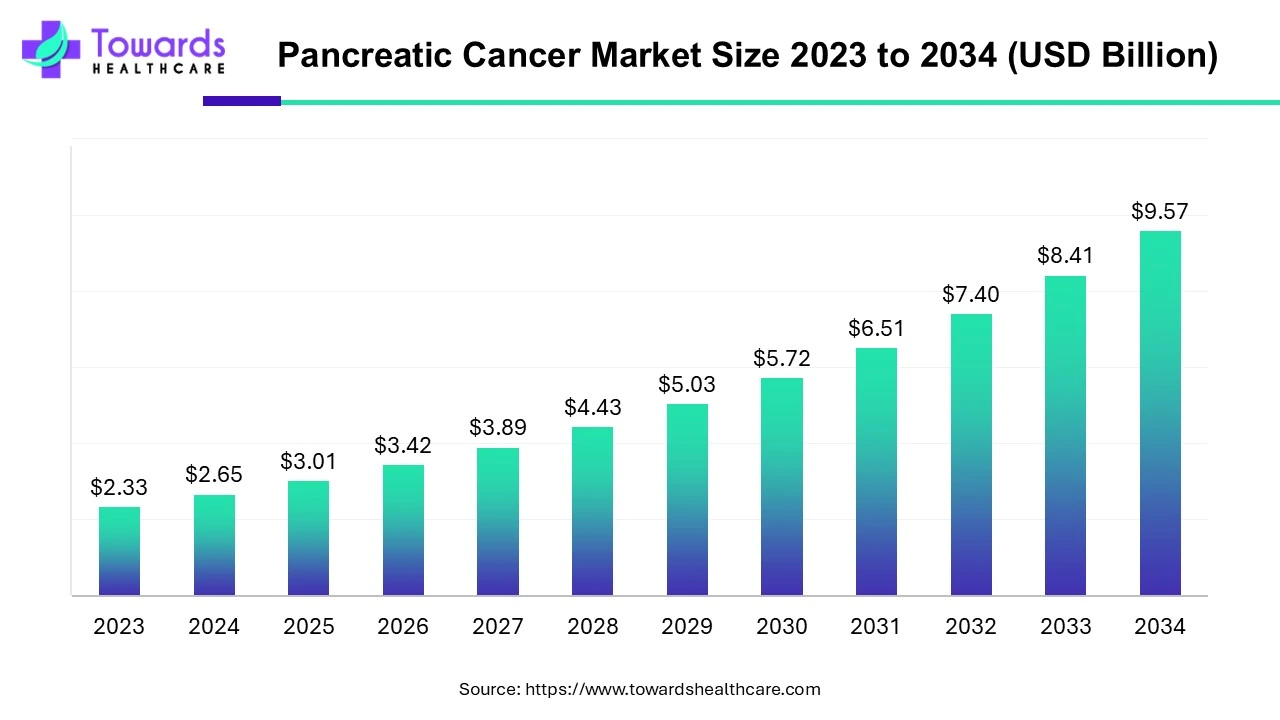
The incidence rate of pancreatic cancer has been steadily increasing by approximately 1% per year.
The pancreatic cancer market refers to the pharmaceutical and healthcare sector focused on the prevention, diagnosis, and treatment of pancreatic cancer. Pancreatic cancer is a highly aggressive and often deadly form of cancer that affects the pancreas, an important organ in the digestive system. It is characterized by a low survival rate and limited treatment options, making it a significant area of focus for medical research and development.
The pancreatic cancer market has witnessed steady growth in recent years, driven by an increasing prevalence of pancreatic cancer cases globally. Pancreatic cancer is the 12th most common cancer globally. The American Cancer Society estimates that around 67,440 people will be diagnosed with pancreatic cancer in 2025, with 51,980 deaths.
The market highlights several key trends and developments that are shaping the market. Two significant trends driving advancements in pancreatic cancer treatment are the focus on early detection and diagnosis, enabled by improved imaging techniques, and the rapid progress in precision medicine. Early detection methods, such as endoscopic ultrasound and magnetic resonance imaging, enhance the ability to identify pancreatic tumors at earlier stages, enabling more effective treatment interventions. Precision medicine, on the other hand, leverages genomic profiling and molecular diagnostics to understand the genetic alterations driving pancreatic cancer, leading to the development of targeted therapies that provide personalized and more efficacious treatment approaches.
Artificial intelligence (AI) and machine learning (ML) play a vital role in revolutionizing pancreatic cancer diagnosis and treatment. AI and ML can screen a large number of people having a high risk of developing pancreatic cancer at later stages. This allows healthcare professionals to take preventive measures. AI and ML can also detect pancreatic cancer through imaging data or other diagnostic tools, enhancing accuracy and precision. AI-enabled diagnostics minimizes manual errors and allows doctors to make timely clinical decisions. Additionally, AI and ML can transform the research and development process to develop novel drugs or medical devices for diagnosing or treating pancreatic cancer. They can also aid in providing personalized treatment to patients and predict treatment outcomes.
Currently, there are no screening tests available to detect pancreatic cancer early, before symptoms appear. However, the National Cancer Institute (NCI) is funding several significant research projects aimed at developing such early-detection tools.
One known risk factor for pancreatic cancer is a recent diagnosis of diabetes, often referred to as new-onset diabetes. Research shows that about 1 in 100 people diagnosed with new-onset diabetes will develop pancreatic cancer within three years. Additionally, about 25% of people with pancreatic cancer had been diagnosed with diabetes before their cancer diagnosis.
To address this, the NCI has funded the New Onset Diabetes (NOD) Study, which is set to run through 2025. This study aims to enroll 10,000 individuals with new-onset diabetes or prediabetes. The goal is to develop a blood test that can identify those few individuals who may need further testing for pancreatic cancer.
Other research teams funded by the NCI and coordinated through the Pancreatic Cancer Detection Consortium (PCDC) are working on creating a blood test for early pancreatic cancer detection in the general population. These researchers are also focusing on improving imaging techniques to detect small tumor deposits in the pancreas.
How Common Is Pancreatic Cancer?
According to the American Cancer Society, the estimated statistics for pancreatic cancer in the United States for 2024 are:
Precision medicine has emerged as a game-changer in the treatment of pancreatic cancer. Traditionally, pancreatic cancer has been challenging to treat due to late-stage diagnosis and limited treatment options. However, precision medicine has revolutionized the landscape by tailoring treatment strategies to individual patients. By 2030, pancreatic ductal adenocarcinoma (PDAC) is projected to become the second leading cause of cancer-related deaths. According to various research studies, advancements in precision medicine for pancreatic ductal adenocarcinoma (PDAC) based on the understanding of its genetics and molecular biology hold promise as an alternative approach to address the heterogeneity among patients and enhance survival outcomes for this disease with poor prognosis. In addition, the rising number of pancreatic cancer patients’ population drives the demand for precision medicine thereby driving the growth of the pancreatic cancer market.
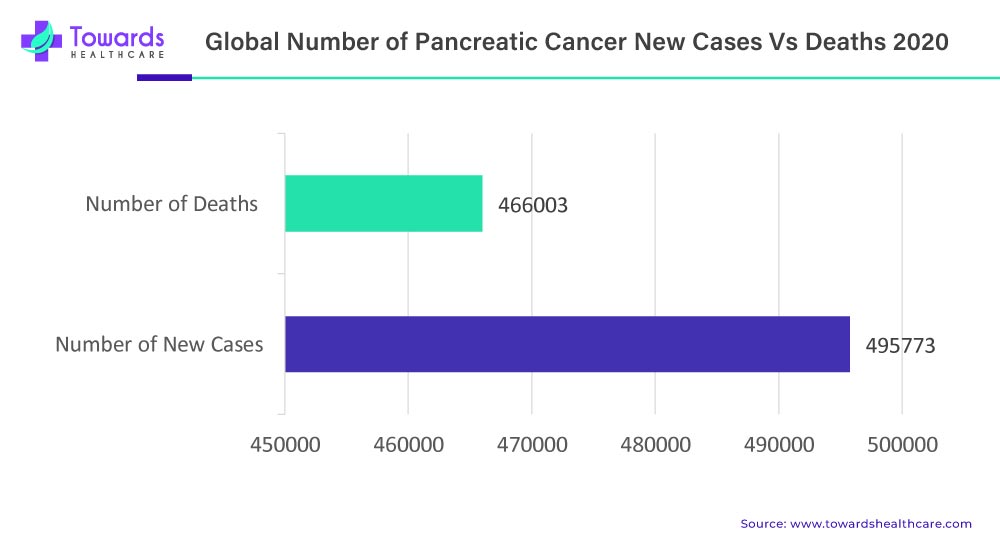
Precision medicine in pancreatic cancer is driven by a comprehensive understanding of the genetic and molecular characteristics of tumors. In March 2022, PrOSPeCT (Precision Oncology Screening Platform Enabling Clinical Trials) a ground-breaking project backed by a $185 million investment led by Omico, the Australian Genomic Cancer Medicine Centre, was announced. The aim of this project was to pioneer new treatment approaches for challenging cancers such as pancreatic cancer, ovarian cancer, sarcomas, and cancer metastasis. The project holds the potential to revolutionize cancer treatment and offer hope to patients across Australia by providing a precision oncology screening platform.By utilizing genomic profiling, healthcare providers can identify specific genetic alterations or mutations that contribute to the development and progression of pancreatic cancer. This knowledge enables the selection of targeted therapies that specifically target these altered genes or proteins, improving treatment outcomes.
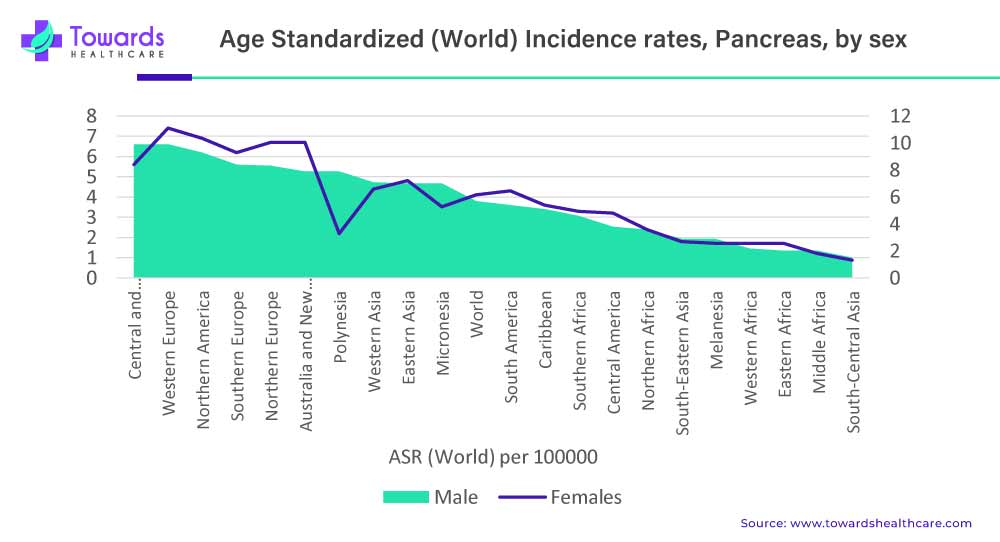
Additionally, precision medicine allows for a more personalized approach to treatment. Each patient's tumor is unique, and by understanding its molecular profile, healthcare providers can tailor treatment regimens to optimize efficacy and minimize side effects. This approach reduces the need for trial-and-error treatment strategies and improves patient outcomes.
However, the widespread adoption of precision medicine in pancreatic cancer faces challenges. Access to genetic testing, cost considerations, and the need for robust infrastructure for data analysis and interpretation are among the barriers that need to be addressed. Despite these challenges, precision medicine holds tremendous promise for transforming the management of pancreatic cancer.
The rising incidence of pancreatic cancer and the urgent need for effective treatment options have led to increased investment in research and development (R&D). Pharmaceutical companies, academic institutions, and government organizations are dedicating resources to advance our understanding of pancreatic cancer biology and develop innovative therapeutic approaches.
Increased investment in research and development (R&D) for pancreatic cancer is driven by the understanding that this disease is highly complex and aggressive, requiring new and innovative treatment strategies.
The aim of increased R&D investment is to develop improved therapies that can significantly impact patient outcomes and quality of life. Pharmaceutical companies are at the forefront of pancreatic cancer research, focusing on the discovery and development of novel therapeutic agents. This includes exploring new drug targets, designing innovative drug delivery systems, and harnessing the potential of immunotherapy and targeted therapies.
Collaborations and partnerships between industry stakeholders, academic institutions, and research organizations are fostering innovation and accelerating the translation of scientific discoveries into clinical applications. In February 2023, UC Davis Comprehensive Cancer Center joined forces with TargaGenix and Northeastern University for a collaborative study focused on pancreatic ductal adenocarcinoma (PDAC). This partnership aims to enhance the understanding of PDAC and explore potential therapeutic strategies through comprehensive research efforts. These collaborations facilitate the sharing of knowledge, resources, and expertise, enabling faster development of potential therapies.
Thus, the increased investment in R&D in pancreatic cancer is driven by the urgency to address the unmet medical needs in the field. Pharmaceutical companies, academic institutions, and government organizations are actively involved in advancing our understanding of pancreatic cancer biology and developing innovative therapeutic approaches.
Despite significant progress in the field of pancreatic cancer treatment, limited therapeutic options remain a major restraint. Pancreatic cancer is characterized by its aggressive nature, late-stage diagnosis, and resistance to conventional treatments. These factors contribute to the limited effectiveness of currently available treatment modalities. Surgery, often considered the primary curative option, is feasible only in a minority of cases. Pancreatic tumors are often detected at advanced stages when surgical intervention is no longer possible due to tumor size, involvement of surrounding structures, or distant metastasis. Additionally, the delicate location of the pancreas and its proximity to critical blood vessels pose challenges during surgical resection.
Chemotherapy and radiation therapy are the mainstay of treatment for inoperable pancreatic cancer. However, their efficacy in improving survival rates and overall patient outcomes remains modest. Chemotherapy regimens, such as gemcitabine-based combinations, have shown limited success in extending survival by a few months. The aggressive nature of pancreatic cancer and the development of resistance to chemotherapy further restrict treatment options.
Moreover, pancreatic cancer exhibits a unique tumor microenvironment that contributes to treatment resistance. The dense stromal tissue surrounding the tumor acts as a barrier, limiting drug penetration and reducing treatment efficacy. Targeting the tumor microenvironment is an area of active research, with the aim of improving drug delivery and sensitizing cancer cells to treatment.
In recent years, targeted therapies have shown promise in various cancer types. However, their success in pancreatic cancer has been limited. The heterogeneous nature of pancreatic tumors, genetic complexity, and the absence of specific targetable mutations pose challenges in developing effective targeted therapies. Despite efforts to identify novel therapeutic targets, such as KRAS mutations, progress has been slow.
Additionally, the lack of biomarkers for early detection and treatment response monitoring hampers the development of personalized treatment approaches. Biomarkers play a crucial role in guiding treatment decisions, predicting treatment response, and assessing disease progression. The identification of reliable biomarkers specific to pancreatic cancer would significantly enhance treatment outcomes and patient management.
Overcoming the limitations of limited treatment options requires a multifaceted approach. Advances in precision medicine, targeted therapies, immunotherapy, and combination therapies hold promise for improving treatment outcomes in pancreatic cancer. Additionally, ongoing research to unravel the complex biology of pancreatic cancer and develop innovative treatment strategies is crucial for addressing this major restraint.
By type, the immunotherapy segment held the largest share of the pancreatic cancer market in 2024. Immunotherapy is a type of treatment regimen that stimulates the body’s immune system to fight against cancer cells. Immunomodulators such as Dostarlimab (Jemperli) and Pembrolizumab (Keytruda) are currently available, FDA-approved therapeutic for treating pancreatic cancer. The growing research and development and favorable regulatory frameworks boost the segment’s growth. Some research studies have also found that immunotherapy may hold promise in advanced, late-stage pancreatic cancer, where other drugs fail. Pancreatic cancer is difficult to diagnose at early stages, hence increasing the demand for immunotherapy.
By type, the chemotherapy segment is expected to grow at the fastest rate in the market during the forecast period. Chemotherapy includes drugs used to kill cancer cells. The growing research and development activities and new product launches favor the segment’s growth. The U.S. Food and Drug Administration (FDA) approved a total of 33 novel chemotherapy drugs in 2023. Chemotherapy, in combination with radiotherapy and surgery, provides complete treatment to pancreatic cancer patients. It can also help in preventing disease recurrence. Gemcitabin, folinic acid, 5-fluorouracil, irinotecan, and oxaliplatin.
By end-user, the hospitals segment led the global market in 2024. The segmental growth is attributed to favorable infrastructure and the presence of skilled professionals. Hospitals are generally part of numerous clinical trials that enable patients to take advantage of clinical trial drugs before market approval. The rising adoption of advanced technologies and suitable capital investments potentiates the installation of advanced equipment related to pancreatic cancer. Hospitals prioritize high-quality care for their patients and follow regulatory guidelines to provide state-of-the-art treatment.
By end-user, the specialty clinics segment is projected to expand rapidly in the market in the coming years. Specialty clinics possess specialized equipment and skilled professionals to provide advanced care. The growing demand for personalized treatment is fulfilled in specialty clinics. They have the necessary infrastructure and suitable resources to invest in advanced medical equipment for diagnosis and treatment. The increasing number of cancer-related specialty clinics also fuels the segment’s growth.
North America dominates the pancreatic cancer market, with the United States being the largest market share holder in the region. The region's strong market position can be attributed to several factors. The United States benefits from a strong healthcare infrastructure and a thriving oncology research ecosystem, with prominent academic institutions, research centers, and pharmaceutical companies actively engaged in pancreatic cancer research and clinical trials. This environment fosters innovation and expedites the application of scientific findings to improve patient care.
Furthermore, the United States has favorable reimbursement policies, ensuring patient access to advanced diagnostic tools, treatment options, supportive care, and a rising patient population. Pancreatic cancer accounts for approximately 3.3% of all new cancer cases in the United States. This facilitates timely diagnosis and comprehensive management of pancreatic cancer, contributing to improved patient outcomes.
The presence of a large patient population and a high healthcare expenditure also contributes to the significant market share of North America. The region's healthcare system invests in state-of-the-art technologies, including advanced imaging techniques, genomic profiling, and targeted therapies. These advancements drive the overall growth of the pancreatic cancer market in North America.
The market is expanding due to rising incidence rates, an aging population, and increasing risk factors like obesity and diabetes. Advances in diagnostics enable earlier detection, while new therapies, including targeted drugs and immunotherapies, drive market growth. High unmet medical needs and poor survival rates encourage significant investment in research and development. Additionally, regulatory incentives such as orphan drug status and accelerated approvals support faster drug launches, making the market more attractive to pharmaceutical companies and boosting its overall value.
The Canadian market is expanding due to rising incidence rates, improved early detection, and growing use of precision medicine. Advances in targeted therapies and ongoing clinical trials, such as NeoPancONE, are driving innovation in treatment. Increased research funding and government support also contribute to the market’s growth, as the focus shifts toward more effective and personalized care for pancreatic cancer patients.
However, it is important to note that other regions, including Europe and Asia Pacific, are also witnessing notable growth in the pancreatic cancer market. European countries, such as Germany, France, and the United Kingdom, have well-established healthcare systems and significant research initiatives in pancreatic cancer. The Asia Pacific region, in particular, is projected to witness the fastest growth in the coming years.
A significant contributor is the region's large and aging population, which naturally leads to a higher number of cancer cases. Lifestyle changes, including increased smoking, alcohol consumption, obesity, and diabetes, have elevated risk levels. Additionally, advancements in healthcare infrastructure, increased government funding, and a surge in clinical research and development activities are enhancing early detection and treatment options. Collaborations between local and global pharmaceutical companies further support the development of innovative therapies, collectively driving the rapid expansion of the pancreatic cancer market in the region.
The Asia Pacific region is expected to witness the fastest growth in the pancreatic cancer market in the upcoming years due to a large and growing population, which translates to a significant patient pool. Countries such as China and India have a high incidence of pancreatic cancer, driven by factors such as population demographics, changing lifestyles, and environmental risk factors. The increasing prevalence of pancreatic cancer in these countries creates a substantial market opportunity.
The market in China is expanding due to a combination of demographic and lifestyle factors. An aging population and increased prevalence of risk factors such as smoking, obesity, and diabetes have led to a significant rise in incidence and mortality rates over recent decades. Urbanization and environmental changes further contribute to this trend. Additionally, advancements in diagnostic technologies have improved detection rates, while ongoing research and development efforts aim to enhance treatment options, collectively driving market growth.
India's market is expanding due to a combination of demographic, lifestyle, and healthcare factors. The country's aging population and increasing prevalence of risk factors such as smoking, obesity, and diabetes contribute to a rising incidence of pancreatic cancer. These elements collectively drive the growth of India's pancreatic cancer market.
Europe is experiencing notable growth in the pancreatic cancer market due to a rising number of cases and increased focus on early diagnosis and advanced treatment options. Countries like Germany and France are expanding their healthcare infrastructure to support better cancer care. These factors, along with technological progress in diagnostics and treatment, are driving significant advancements in pancreatic cancer care across the region.
The UK market is expanding due to rising incidence rates, advancements in targeted therapies and diagnostics, and a growing focus on precision medicine. Increased awareness, early detection efforts, and government-backed healthcare initiatives are driving innovation and improved patient outcomes, making this one of the fastest-evolving oncology segments in the country.
Emerging therapies and clinical trials represent a major opportunity in the pancreatic cancer market. The development of innovative treatment modalities and the evaluation of novel therapeutic agents through clinical trials hold promise for improving patient outcomes and expanding treatment options.
One area of opportunity lies in immunotherapy, which has shown remarkable success in various cancer types. Immunotherapies, such as immune checkpoint inhibitors and chimeric antigen receptor (CAR) T-cell therapy, are being investigated in pancreatic cancer clinical trials. These therapies harness the power of the immune system to recognize and destroy cancer cells. While immunotherapy has shown limited success in pancreatic cancer to date, ongoing research aims to identify biomarkers and combination approaches that can enhance its effectiveness.
Another emerging area of opportunity is targeted therapies. Advances in understanding the genetic alterations and signaling pathways involved in pancreatic cancer have paved the way for the development of targeted therapies. Targeted agents that specifically inhibit key molecules or pathways implicated in pancreatic cancer progression are being investigated. These therapies aim to disrupt the abnormal cellular signaling, promote cancer cell death, and overcome treatment resistance.
Additionally, combination therapies are being explored to enhance treatment efficacy. Combining different treatment modalities, such as chemotherapy, targeted therapy, immunotherapy, and radiation therapy, has the potential to improve response rates and overcome resistance mechanisms. Clinical trials evaluating various combination approaches are underway, offering hope for more effective treatment options in the future.
Furthermore, the development of predictive biomarkers is a significant opportunity in pancreatic cancer. Biomarkers play a crucial role in patient selection, treatment response monitoring, and identifying potential side effects. The identification of reliable biomarkers can enable personalized treatment approaches, improve treatment outcomes, and optimize patient management.
Clinical trials play a pivotal role in evaluating the safety and efficacy of emerging therapies. Participation in clinical trials provides access to cutting-edge treatments and allows patients to contribute to the advancement of pancreatic cancer research. Market players should actively support and invest in clinical trials to accelerate the development of innovative therapies and expand the treatment armamentarium for pancreatic cancer.
Thus, emerging therapies and clinical trials present a major opportunity in the pancreatic cancer market. Immunotherapy, targeted therapies, combination approaches, and the identification of predictive biomarkers offer hope for improved treatment outcomes and expanded treatment options. By actively investing in research and development, supporting clinical trials, and fostering collaborations, market players can contribute to the advancement of pancreatic cancer treatment and make a positive impact on patient care.
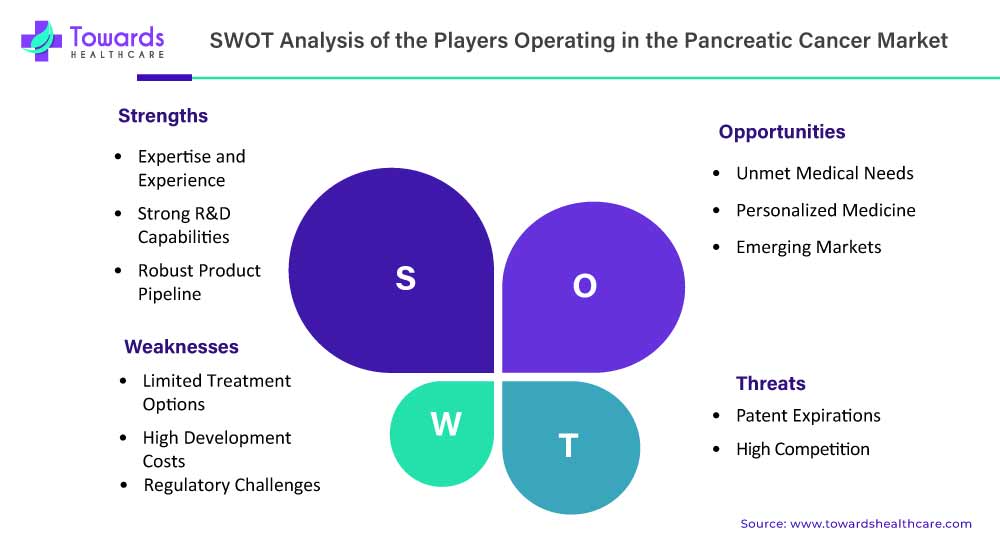
In November 2024, PCI Pharma Services announced a collaboration with ChiRhoClin to address the potential shortage of ChiRhoStim, a diagnostic drug to detect pancreatic cancer. Shawn Cain, Senior Vice President of PCI Pharma Services, commented that it is a point of pride to assist with such mission-critical and time-sensitive projects. He added that the partnership can combine precision, quality, and speed to market.
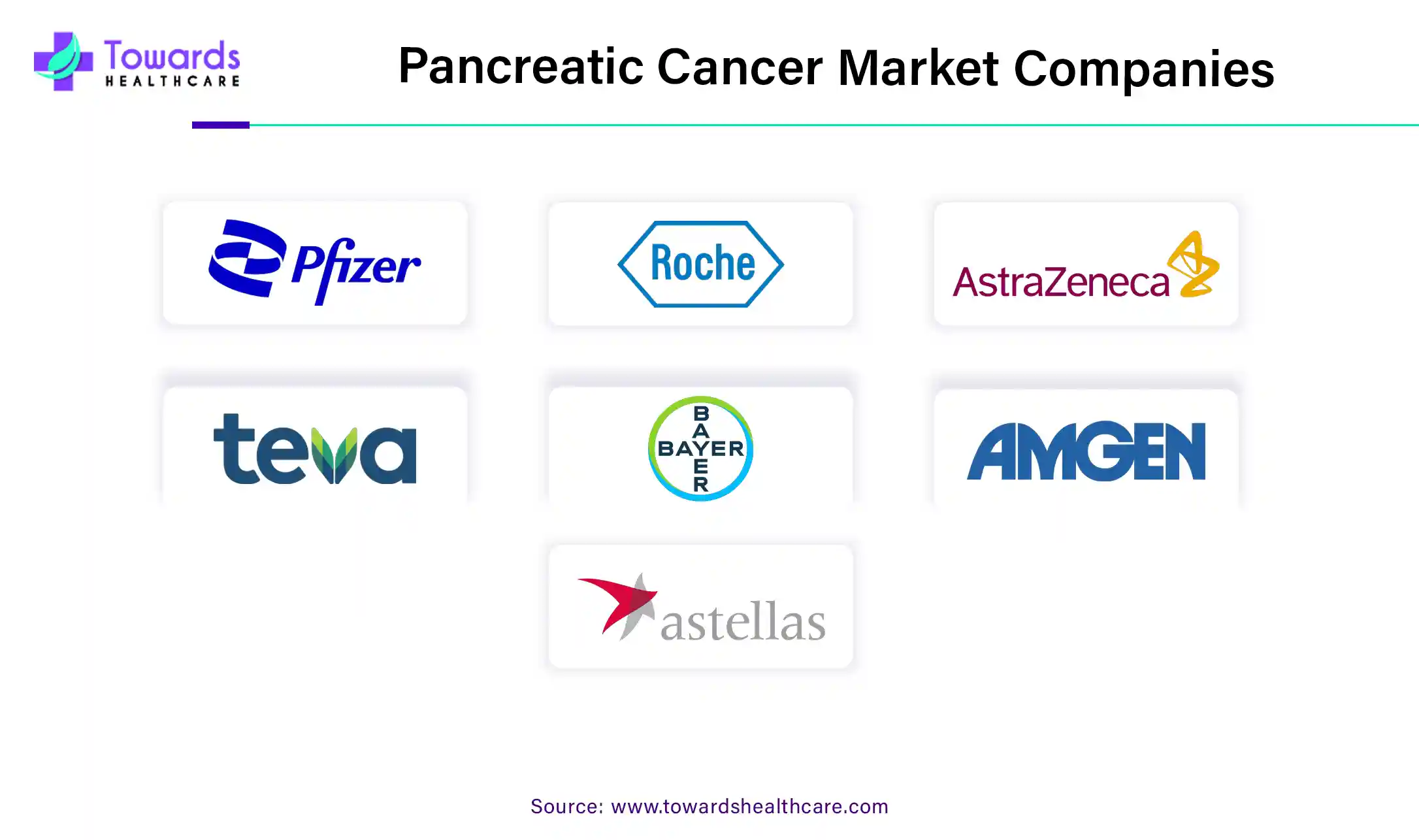
The market is highly competitive, with both established pharmaceutical companies and emerging biotech firms actively involved in research and development activities. Companies in the pancreatic cancer market often collaborate with academic institutions, research organizations, and other stakeholders to drive innovation and advance scientific knowledge in the field. These collaborations help in the discovery and development of novel therapeutic targets and treatment approaches.
By Type
By End-users
By Geography
January 2026
December 2025
December 2025
December 2025